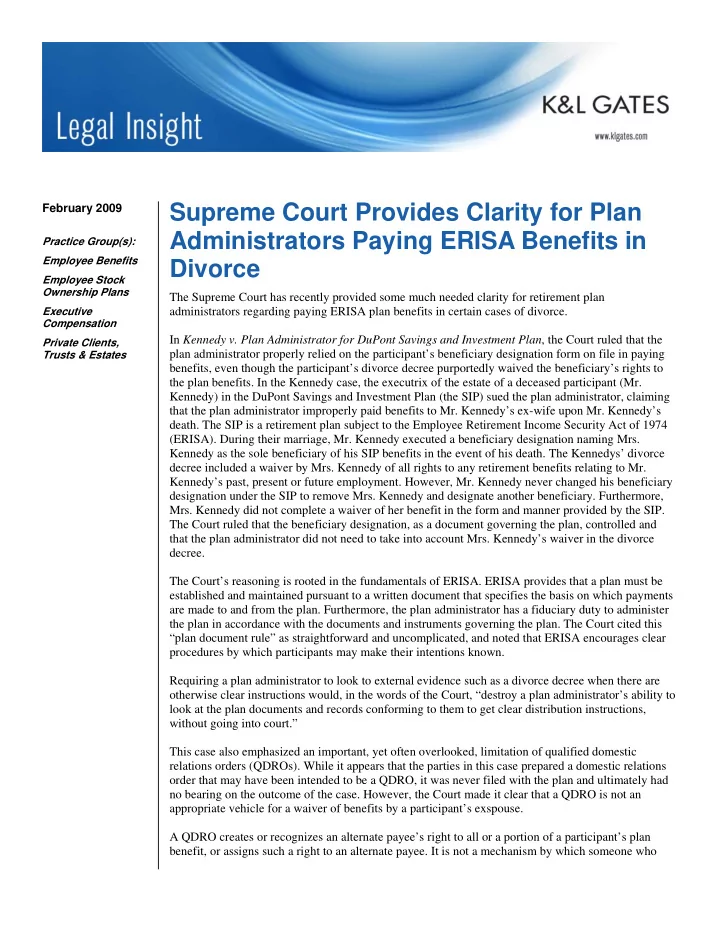

Supreme Court Provides Clarity for Plan February 2009 Administrators Paying ERISA Benefits in Practice Group(s): Employee Benefits Divorce Employee Stock Ownership Plans The Supreme Court has recently provided some much needed clarity for retirement plan Executive administrators regarding paying ERISA plan benefits in certain cases of divorce. Compensation In Kennedy v. Plan Administrator for DuPont Savings and Investment Plan , the Court ruled that the Private Clients, plan administrator properly relied on the participant’s beneficiary designation form on file in paying Trusts & Estates benefits, even though the participant’s divorce decree purportedly waived the beneficiary’s rights to the plan benefits. In the Kennedy case, the executrix of the estate of a deceased participant (Mr. Kennedy) in the DuPont Savings and Investment Plan (the SIP) sued the plan administrator, claiming that the plan administrator improperly paid benefits to Mr. Kennedy’s ex-wife upon Mr. Kennedy’s death. The SIP is a retirement plan subject to the Employee Retirement Income Security Act of 1974 (ERISA). During their marriage, Mr. Kennedy executed a beneficiary designation naming Mrs. Kennedy as the sole beneficiary of his SIP benefits in the event of his death. The Kennedys’ divorce decree included a waiver by Mrs. Kennedy of all rights to any retirement benefits relating to Mr. Kennedy’s past, present or future employment. However, Mr. Kennedy never changed his beneficiary designation under the SIP to remove Mrs. Kennedy and designate another beneficiary. Furthermore, Mrs. Kennedy did not complete a waiver of her benefit in the form and manner provided by the SIP. The Court ruled that the beneficiary designation, as a document governing the plan, controlled and that the plan administrator did not need to take into account Mrs. Kennedy’s waiver in the divorce decree. The Court’s reasoning is rooted in the fundamentals of ERISA. ERISA provides that a plan must be established and maintained pursuant to a written document that specifies the basis on which payments are made to and from the plan. Furthermore, the plan administrator has a fiduciary duty to administer the plan in accordance with the documents and instruments governing the plan. The Court cited this “plan document rule” as straightforward and uncomplicated, and noted that ERISA encourages clear procedures by which participants may make their intentions known. Requiring a plan administrator to look to external evidence such as a divorce decree when there are otherwise clear instructions would, in the words of the Court, “destroy a plan administrator’s ability to look at the plan documents and records conforming to them to get clear distribution instructions, without going into court.” This case also emphasized an important, yet often overlooked, limitation of qualified domestic relations orders (QDROs). While it appears that the parties in this case prepared a domestic relations order that may have been intended to be a QDRO, it was never filed with the plan and ultimately had no bearing on the outcome of the case. However, the Court made it clear that a QDRO is not an appropriate vehicle for a waiver of benefits by a participant’s exspouse. A QDRO creates or recognizes an alternate payee’s right to all or a portion of a participant’s plan benefit, or assigns such a right to an alternate payee. It is not a mechanism by which someone who
Supreme Court Provides Clarity for Plan Administrators Paying ERISA Benefits in Divorce otherwise may have become an alternate payee may waive his or her rights as an alternate payee. It would be permissible for a plan sponsor to provide a separate method for such a waiver of benefits. The Kennedy case confirms that plan administrators must rely on the documents and instruments governing the plan in making benefit determinations. This means that a plan administrator may rely on beneficiary designations and properly filed QDROs in determining the proper payee of benefits, particularly in the case of divorce. Extraneous documents such as a divorce decree should, in most cases, not affect the plan administrator’s actions. Plan sponsors may wish to consider amending their plans to provide that, in the event of a divorce, any beneficiary designations the participant previously executed in favor of the then-ex-spouse are automatically revoked. In most cases, this would likely achieve the participant’s desired result, and in cases where the participant still wishes the ex-spouse to be the beneficiary a new beneficiary designation could be completed after the divorce. Individuals should remember to update all of their beneficiary designations for retirement benefits in the event of divorce, even if the divorce decree (or state law, which is generally preempted by ERISA) appears to address the treatment of the parties’ retirement benefits. Failure to update beneficiary designations can result in an exspouse receiving a benefit that neither party intended the ex-spouse to receive. Finally, it is not clear how this ruling may apply to death benefits under welfare plans subject to ERISA, as there was no welfare plan benefit at issue here. However, given that the plan document rule relied on by the Court applies equally to welfare plans subject to ERISA, it would be reasonable to conclude that a similar result would be reached in the case of welfare plan death benefits. Note that insured welfare benefits are subject to state laws regulating insurance even if the benefits are covered by ERISA. Such laws may impact who is considered the beneficiary of life or accidental death insurance subsequent to a divorce. Authors: Douglas M. Love Doug.love@klgates.com +1.206.370.7592 Deirdre C. Thomas Deirdre.thomas@klgates.com +1.206.370.5894 2
Supreme Court Provides Clarity for Plan Administrators Paying ERISA Benefits in Divorce 3
Recommend
More recommend